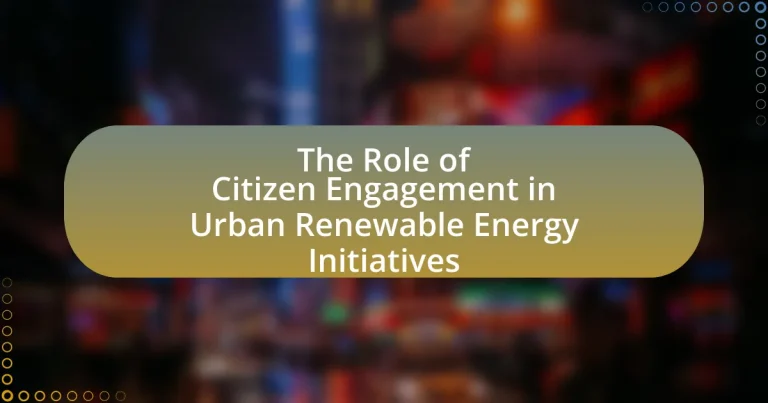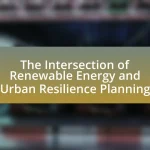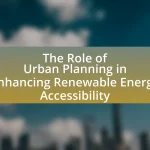Citizen engagement is a vital component of urban renewable energy initiatives, significantly influencing project planning, implementation, and sustainability. The article explores how active participation from community members enhances project relevance, acceptance, and long-term success, supported by research from the International Renewable Energy Agency. Key components of effective citizen engagement include awareness, collaboration, and feedback mechanisms, while challenges such as socio-economic disparities and lack of information can hinder participation. The article also highlights best practices and strategies for fostering citizen involvement, emphasizing the importance of transparent communication and educational outreach in achieving successful renewable energy outcomes.
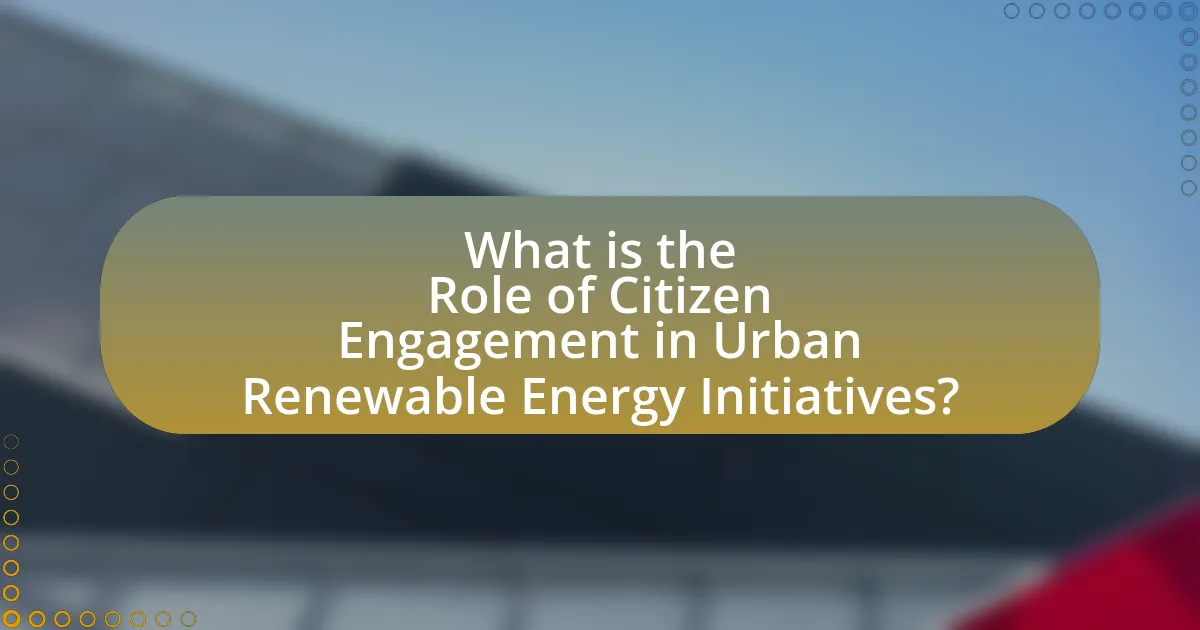
What is the Role of Citizen Engagement in Urban Renewable Energy Initiatives?
Citizen engagement plays a crucial role in urban renewable energy initiatives by fostering community involvement and support for sustainable practices. Engaged citizens contribute to the planning and implementation of renewable energy projects, ensuring that these initiatives reflect local needs and preferences. Studies, such as the one conducted by the International Renewable Energy Agency, indicate that projects with high levels of citizen participation are more likely to succeed and achieve long-term sustainability. Furthermore, citizen engagement enhances transparency and accountability, leading to increased trust in local governments and energy providers. This collaborative approach not only empowers communities but also accelerates the transition to renewable energy sources in urban settings.
How does citizen engagement influence urban renewable energy projects?
Citizen engagement significantly influences urban renewable energy projects by enhancing community support, ensuring project relevance, and improving implementation success. Engaged citizens contribute valuable local knowledge, which helps tailor renewable energy solutions to specific community needs and preferences. For instance, studies show that projects with high levels of public participation are more likely to receive funding and achieve operational efficiency. Research conducted by the International Renewable Energy Agency indicates that community-driven initiatives can lead to a 20% increase in project acceptance rates, demonstrating the critical role of citizen involvement in fostering sustainable urban energy transitions.
What are the key components of citizen engagement in these initiatives?
The key components of citizen engagement in urban renewable energy initiatives include awareness, participation, collaboration, and feedback mechanisms. Awareness involves educating citizens about renewable energy benefits and opportunities, which fosters informed participation. Participation allows citizens to actively contribute to decision-making processes, ensuring their voices are heard. Collaboration between local governments, organizations, and citizens enhances resource sharing and collective problem-solving. Feedback mechanisms enable citizens to express their opinions and experiences, facilitating continuous improvement of initiatives. These components are essential for creating a sustainable and inclusive approach to urban renewable energy development.
How do citizens contribute to the planning and implementation of renewable energy projects?
Citizens contribute to the planning and implementation of renewable energy projects by participating in public consultations, providing feedback, and engaging in community decision-making processes. Their involvement ensures that local needs and preferences are considered, which can lead to increased project acceptance and support. For instance, studies have shown that projects with strong community engagement are more likely to succeed; a report by the International Renewable Energy Agency indicates that community involvement can enhance project viability by up to 30%. Additionally, citizens often participate in advocacy and educational initiatives, raising awareness about renewable energy benefits and influencing policy decisions at local and regional levels.
Why is citizen engagement important for urban renewable energy initiatives?
Citizen engagement is crucial for urban renewable energy initiatives because it fosters community support, enhances project relevance, and ensures sustainable implementation. Engaged citizens contribute valuable local knowledge, which helps tailor energy solutions to specific community needs, increasing the likelihood of project acceptance and success. Studies show that projects with high levels of public participation are more likely to achieve their goals; for instance, a report by the International Renewable Energy Agency indicates that community involvement can lead to a 30% increase in project efficiency. Additionally, citizen engagement promotes transparency and accountability, which are essential for building trust and long-term commitment to renewable energy initiatives.
What benefits does citizen engagement bring to renewable energy projects?
Citizen engagement brings several benefits to renewable energy projects, including enhanced project acceptance, improved decision-making, and increased community investment. Engaging citizens fosters trust and transparency, which can lead to higher levels of support for renewable initiatives. Research indicates that projects with strong community involvement experience a 20% increase in public acceptance compared to those without. Additionally, citizen input can lead to more effective and tailored solutions that address local needs, ultimately resulting in better project outcomes. Studies show that when communities are actively involved, they are more likely to invest in and support renewable energy initiatives, creating a sense of ownership and responsibility.
How does citizen involvement enhance project sustainability and acceptance?
Citizen involvement enhances project sustainability and acceptance by fostering a sense of ownership and accountability among community members. When citizens actively participate in urban renewable energy initiatives, they contribute valuable local knowledge and preferences, which can lead to more tailored and effective solutions. Research indicates that projects with high levels of community engagement experience greater long-term support and maintenance, as seen in the case of the Samso Island project in Denmark, where local involvement led to a 100% renewable energy supply. This engagement not only increases the likelihood of project success but also builds trust between stakeholders, ensuring that the initiatives align with community values and needs.
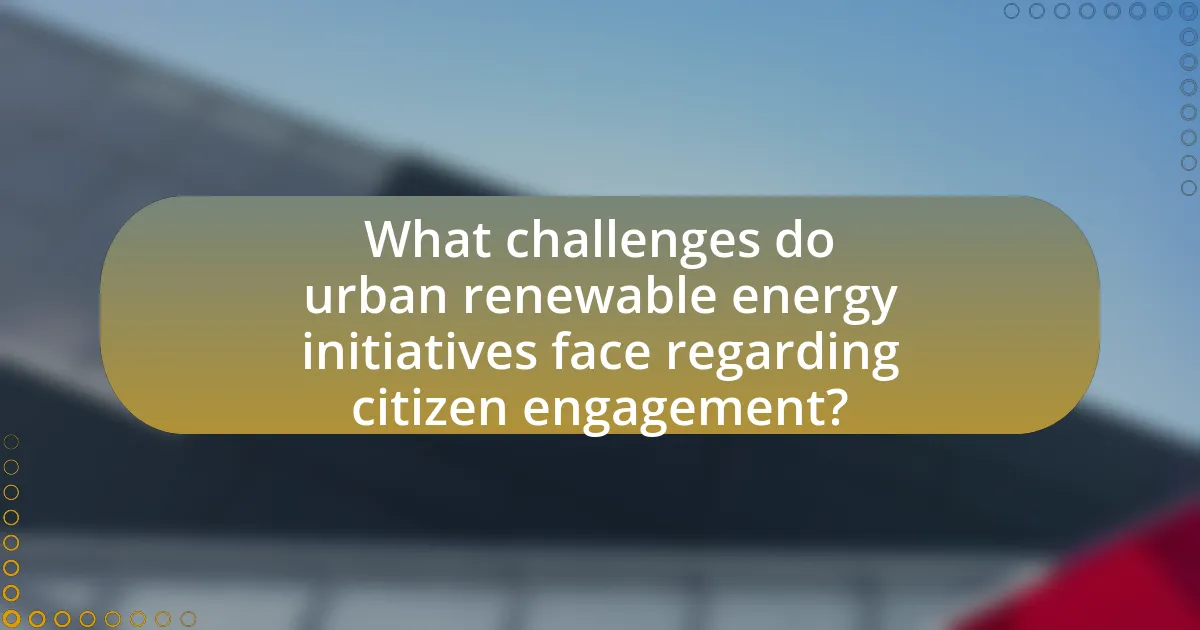
What challenges do urban renewable energy initiatives face regarding citizen engagement?
Urban renewable energy initiatives face significant challenges regarding citizen engagement, primarily due to a lack of awareness and understanding among the public. Many citizens are not informed about the benefits and functionalities of renewable energy technologies, leading to skepticism and resistance to change. Research indicates that only 30% of urban residents are aware of local renewable energy projects, which hampers participation and support. Additionally, socio-economic factors create disparities in engagement, as marginalized communities often lack access to information and resources necessary to participate effectively. This disconnect can result in feelings of exclusion and distrust towards initiatives, further complicating efforts to foster community involvement.
What barriers exist to effective citizen participation in these initiatives?
Barriers to effective citizen participation in urban renewable energy initiatives include lack of awareness, limited access to information, and socio-economic disparities. Many citizens are unaware of the initiatives or how they can contribute, which hinders engagement. Additionally, information about these projects is often not readily accessible or is presented in technical jargon that is difficult for the general public to understand. Socio-economic factors also play a significant role; individuals from lower-income backgrounds may lack the resources or time to participate actively. Studies indicate that these barriers can lead to unequal representation in decision-making processes, ultimately affecting the success of renewable energy initiatives.
How do socio-economic factors impact citizen engagement in renewable energy?
Socio-economic factors significantly impact citizen engagement in renewable energy by influencing access to information, financial resources, and community involvement. Individuals from higher socio-economic backgrounds often have greater access to education and information about renewable energy technologies, leading to increased awareness and participation in initiatives. For instance, a study by the International Renewable Energy Agency (IRENA) found that communities with higher income levels are more likely to invest in solar energy systems, as they can afford the upfront costs and have better access to financing options. Additionally, socio-economic status affects the perceived benefits of renewable energy, with wealthier citizens more likely to engage in advocacy and support policies that promote sustainable practices.
What role does education play in fostering citizen involvement?
Education plays a crucial role in fostering citizen involvement by equipping individuals with the knowledge and skills necessary to engage in civic activities. Through education, citizens gain awareness of their rights, responsibilities, and the importance of participation in democratic processes. For instance, studies show that communities with higher levels of education tend to have greater voter turnout and participation in local governance, as educated individuals are more likely to understand the implications of policies and initiatives. Furthermore, educational programs focused on renewable energy can empower citizens to advocate for sustainable practices and participate in urban energy initiatives, thereby enhancing community engagement and collaboration in addressing environmental challenges.
How can urban planners overcome challenges to citizen engagement?
Urban planners can overcome challenges to citizen engagement by implementing inclusive communication strategies and utilizing technology to facilitate participation. For instance, planners can host community workshops and utilize online platforms to gather feedback, ensuring diverse voices are heard. Research indicates that cities employing digital engagement tools, such as interactive mapping and social media, have seen increased participation rates; for example, a study by the Urban Institute found that cities using these methods reported a 30% rise in citizen involvement in planning processes. By prioritizing transparency and accessibility, urban planners can effectively bridge the gap between citizens and decision-making, fostering a collaborative environment essential for successful urban renewable energy initiatives.
What strategies can be implemented to improve citizen participation?
To improve citizen participation in urban renewable energy initiatives, strategies such as enhancing communication channels, providing educational resources, and fostering collaborative decision-making can be implemented. Effective communication channels, including social media and community forums, allow citizens to voice their opinions and stay informed about renewable energy projects. Educational resources, such as workshops and informational sessions, empower citizens with knowledge about the benefits and processes of renewable energy, increasing their engagement. Collaborative decision-making, where citizens are actively involved in planning and implementation, ensures that their perspectives are considered, leading to greater investment in the initiatives. Research indicates that communities with strong citizen engagement in energy projects report higher satisfaction and support for renewable initiatives, as seen in studies conducted by the International Renewable Energy Agency.
How can technology facilitate better engagement with citizens?
Technology can facilitate better engagement with citizens by providing platforms for real-time communication and feedback. Digital tools such as mobile applications, social media, and online surveys enable citizens to express their opinions, access information, and participate in decision-making processes. For instance, cities that implement smart city technologies often report increased citizen involvement in urban planning initiatives, as these technologies allow for transparent sharing of data and project updates. A study by the International City/County Management Association found that 70% of local governments using technology for citizen engagement saw improved public satisfaction and participation rates.
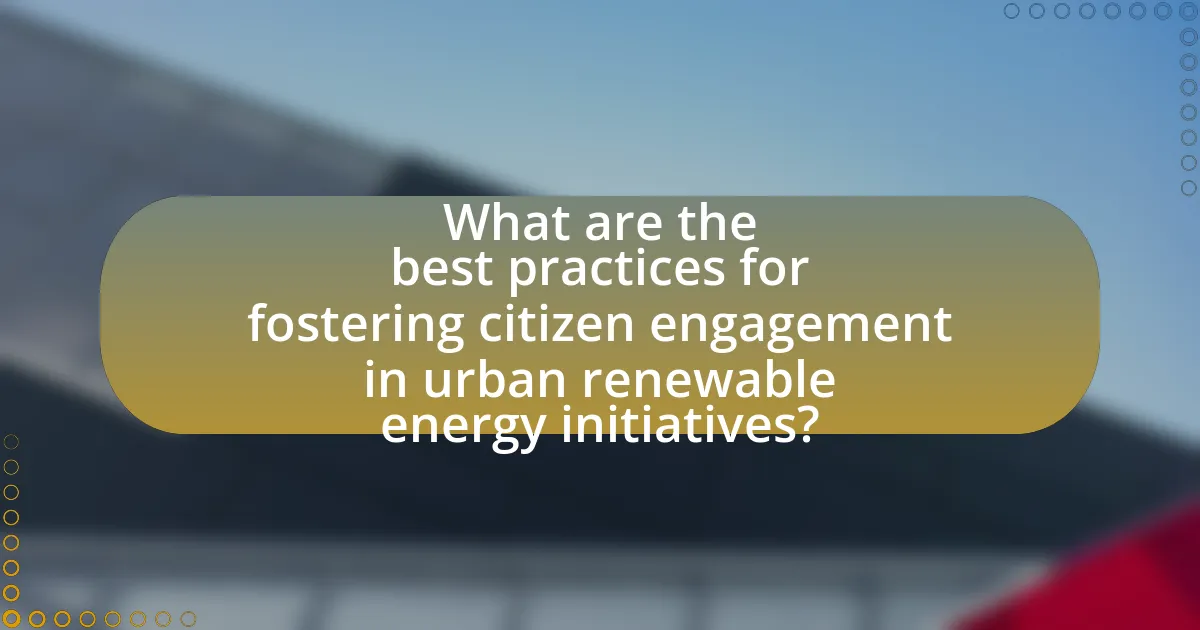
What are the best practices for fostering citizen engagement in urban renewable energy initiatives?
The best practices for fostering citizen engagement in urban renewable energy initiatives include transparent communication, inclusive decision-making, and educational outreach. Transparent communication ensures that citizens are informed about project goals, benefits, and impacts, which builds trust and encourages participation. Inclusive decision-making involves actively involving community members in the planning and implementation processes, allowing their voices to shape the initiatives. Educational outreach, through workshops and informational campaigns, raises awareness about renewable energy benefits and empowers citizens to take part in local projects. Research indicates that cities employing these practices see higher levels of citizen participation and support for renewable energy initiatives, as evidenced by case studies from cities like San Diego and Copenhagen, which have successfully engaged their communities in sustainable energy projects.
What methods can be used to effectively engage citizens in these projects?
Effective methods to engage citizens in urban renewable energy initiatives include participatory planning, community workshops, and digital platforms for feedback. Participatory planning allows citizens to contribute to decision-making processes, fostering a sense of ownership and responsibility. Community workshops facilitate direct interaction between project leaders and residents, enabling the exchange of ideas and concerns. Digital platforms, such as social media and dedicated websites, provide accessible channels for citizens to share their opinions and stay informed about project developments. Research indicates that projects with high levels of citizen engagement are more likely to succeed, as evidenced by the 2019 study published in the Journal of Urban Technology, which found that community involvement significantly enhances project acceptance and sustainability.
How can community workshops and forums enhance citizen involvement?
Community workshops and forums enhance citizen involvement by providing platforms for direct communication and collaboration among residents, local leaders, and stakeholders. These gatherings facilitate the sharing of information, allowing citizens to express their concerns, ideas, and preferences regarding urban renewable energy initiatives. Research indicates that participatory approaches, such as those used in community workshops, lead to increased public trust and ownership of projects, as evidenced by a study published in the Journal of Environmental Management, which found that communities engaged in participatory planning processes were more likely to support and participate in sustainability initiatives. By fostering dialogue and collective decision-making, community workshops and forums empower citizens to take an active role in shaping their environment and influence energy policies that affect their lives.
What role do social media and digital platforms play in citizen engagement?
Social media and digital platforms serve as crucial tools for enhancing citizen engagement by facilitating communication, information sharing, and participation in decision-making processes. These platforms enable citizens to voice their opinions, access real-time information, and collaborate on urban renewable energy initiatives, thereby fostering a sense of community and collective action. For instance, studies show that 70% of citizens prefer using social media to engage with local governments, highlighting its effectiveness in bridging the gap between authorities and the public. Additionally, platforms like Facebook and Twitter allow for the rapid dissemination of information regarding renewable energy projects, encouraging public involvement and feedback, which can lead to more informed and responsive urban planning.
What lessons can be learned from successful urban renewable energy initiatives?
Successful urban renewable energy initiatives demonstrate the importance of citizen engagement in achieving sustainability goals. Engaging local communities fosters a sense of ownership and responsibility, leading to higher participation rates and support for renewable projects. For instance, the Solar Neighborhoods program in San Diego involved residents in decision-making processes, resulting in a 30% increase in solar installations compared to similar areas without such engagement. Additionally, successful initiatives often incorporate education and outreach efforts, which enhance public understanding of renewable energy benefits, as evidenced by the Green City initiative in Amsterdam, where community workshops led to a 25% increase in local renewable energy adoption. These examples illustrate that active citizen involvement is crucial for the success and scalability of urban renewable energy projects.
Which case studies exemplify effective citizen engagement?
Case studies that exemplify effective citizen engagement include the “Solarize” campaigns in various U.S. cities, which successfully mobilized community members to adopt solar energy through collective purchasing programs. These initiatives demonstrated significant citizen involvement, with cities like Portland, Oregon, achieving over 1,000 solar installations in a single campaign, showcasing the power of community-driven efforts in renewable energy adoption. Another notable example is the “Participatory Budgeting” process in Paris, where citizens directly influence budget allocations for local renewable energy projects, resulting in increased public investment in sustainable initiatives. These case studies illustrate how structured citizen engagement can lead to substantial advancements in urban renewable energy initiatives.
What common factors contribute to the success of these initiatives?
Common factors that contribute to the success of urban renewable energy initiatives include strong community involvement, effective communication, and supportive policy frameworks. Strong community involvement ensures that local residents are engaged in the planning and implementation processes, which fosters a sense of ownership and commitment to the initiatives. Effective communication helps to disseminate information about the benefits and opportunities of renewable energy, thereby increasing public awareness and participation. Supportive policy frameworks provide the necessary regulations and incentives that facilitate the development and integration of renewable energy solutions. For instance, studies have shown that cities with active citizen participation and clear policy support, such as Freiburg in Germany, have successfully implemented renewable energy projects, resulting in significant increases in energy efficiency and sustainability.
How can citizens actively participate in urban renewable energy initiatives?
Citizens can actively participate in urban renewable energy initiatives by engaging in community solar projects, advocating for policy changes, and utilizing energy-efficient practices. Community solar projects allow citizens to invest in or subscribe to solar energy systems, thereby contributing to local renewable energy generation. Advocacy for policy changes can involve participating in public meetings, joining local environmental organizations, or supporting legislation that promotes renewable energy. Additionally, adopting energy-efficient practices at home, such as using LED lighting and energy-efficient appliances, helps reduce overall energy consumption and supports urban sustainability efforts. These actions collectively empower citizens to influence and enhance urban renewable energy initiatives effectively.
What steps can individuals take to get involved in local renewable energy projects?
Individuals can get involved in local renewable energy projects by participating in community meetings, joining local advocacy groups, and volunteering for renewable energy initiatives. Community meetings often provide information on upcoming projects and opportunities for public input, while advocacy groups focus on promoting renewable energy policies and practices. Volunteering for initiatives, such as solar panel installations or energy efficiency workshops, allows individuals to gain hands-on experience and contribute to local efforts. According to a report by the International Renewable Energy Agency, community engagement significantly enhances the success of renewable energy projects by fostering local support and participation.
How can citizens advocate for more sustainable energy policies in their communities?
Citizens can advocate for more sustainable energy policies in their communities by organizing grassroots campaigns that promote awareness and education about renewable energy options. Engaging local government officials through public meetings and forums allows citizens to voice their support for sustainable initiatives, influencing policy decisions. Research shows that communities with active citizen engagement in energy policy discussions are more likely to adopt renewable energy solutions, as evidenced by the success of initiatives like the Solarize program, which has led to increased solar installations in various cities.
